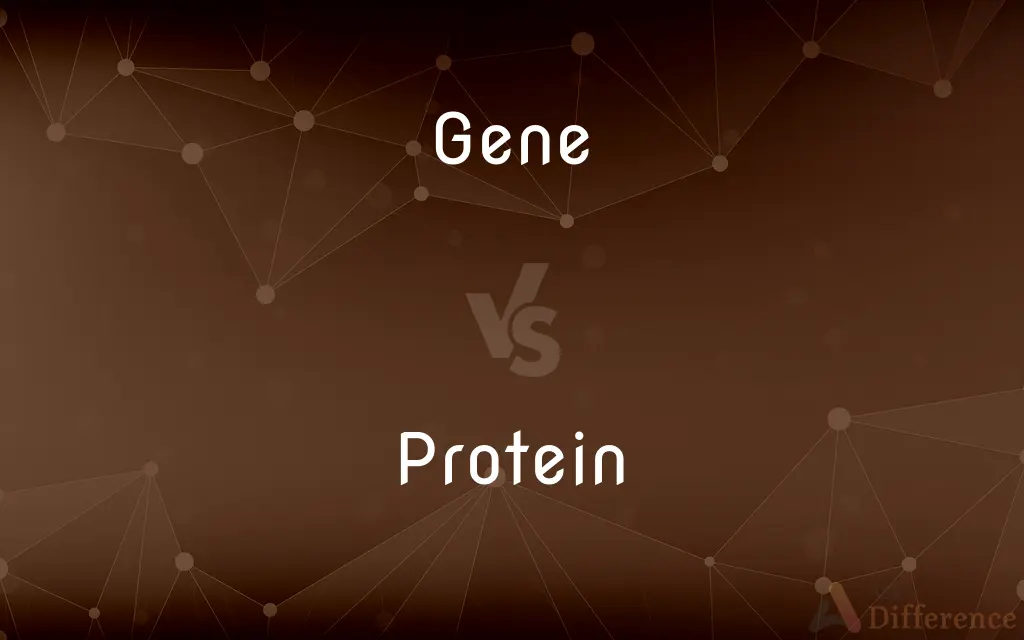Gene vs. Protein — What's the Difference?

Difference Between Gene and Protein
ADVERTISEMENT
Compare with Definitions
Gene
In biology, a gene (from genos (Greek) meaning generation or birth or gender) is a basic unit of heredity and a sequence of nucleotides in DNA or RNA that encodes the synthesis of a gene product, either RNA or protein.During gene expression, the DNA is first copied into RNA. The RNA can be directly functional or be the intermediate template for a protein that performs a function. The transmission of genes to an organism's offspring is the basis of the inheritance of phenotypic traits.
Protein
Proteins are large biomolecules and macromolecules that are comprised of one or more long chains of amino acid residues. Proteins perform a vast array of functions within organisms, including catalysing metabolic reactions, DNA replication, responding to stimuli, providing structure to cells and organisms, and transporting molecules from one location to another.
Gene
(in informal use) a unit of heredity which is transferred from a parent to offspring and is held to determine some characteristic of the offspring
Playing tennis is in my genes
Protein
Any of a group of complex organic macromolecules that contain carbon, hydrogen, oxygen, nitrogen, and usually sulfur and are composed of one or more chains of amino acids. Proteins are fundamental components of all living cells and include many substances, such as enzymes, hormones, and antibodies, that are necessary for the proper functioning of an organism. They are essential in the diet of animals for the growth and repair of tissue and can be obtained from foods such as meat, fish, eggs, milk, and legumes.
Gene
A hereditary unit consisting of a sequence of DNA that occupies a specific location on a chromosome and is transcribed into an RNA molecule that may function directly or be translated into an amino acid chain. Genes undergo mutation when their DNA sequences change.
ADVERTISEMENT
Protein
Any of numerous large, complex naturally-produced molecules composed of one or more long chains of amino acids, in which the amino acid groups are held together by peptide bonds.
Amino acid
Gene
(genetics) A theoretical unit of heredity of living organisms; a gene may take several values and in principle predetermines a precise trait of an organism's form (phenotype), such as hair color.
Protein
One of three major classes of food or source of food energy (4 kcal/gram) abundant in animal-derived foods i.e. meat and some vegetables, such as legumes.
Gene
(molecular biology) A segment of DNA or RNA from a cell's or an organism's genome, that may take several forms and thus parameterizes a phenomenon, in general the structure of a protein; locus.
A change in a gene is reflected in the protein or RNA molecule that it codes for.
Protein
A food rich in protein, often a meat or meat substitute.
Gene
(genetics) a segment of DNA that is involved in producing a polypeptide chain; it can include regions preceding and following the coding DNA as well as introns between the exons; it is considered a unit of heredity;
Genes were formerly called factors
Protein
In chemical analysis, the total nitrogenous material in vegetable or animal substances, obtained by multiplying the total nitrogen found by a factor, usually 6.25, assuming most proteids to contain approximately 16 per cent of nitrogen.
Protein
Any polymer of an amino acid joined by peptide (amide) bonds. Most natural proteins have alpha-amino acids as the monomeric constituents. All classical enzymes are composed of protein, and control most of the biochemical transformations carrie dout in living cells. They may be soluble, as casein, albumins, and other globular proteins, or insoluble (e. g. "structural proteins"), as collagen or keratin. "albumin", an older term for protein, is now used primarily to refer to certain specific soluble globular proteins found in eggs or blood serum, e.g. bovine serum albumin, the main soluble protein in teh serum of cattle, used as an enzymatically inert protein in biochemical research.
Protein
Any of a large group of nitrogenous organic compounds that are essential constituents of living cells; consist of polymers of amino acids; essential in the diet of animals for growth and for repair of tissues; can be obtained from meat and eggs and milk and legumes;
A diet high in protein
Share Your Discovery

Previous Comparison
Muse vs. Mouse
Next Comparison
Starred vs. Stared













































